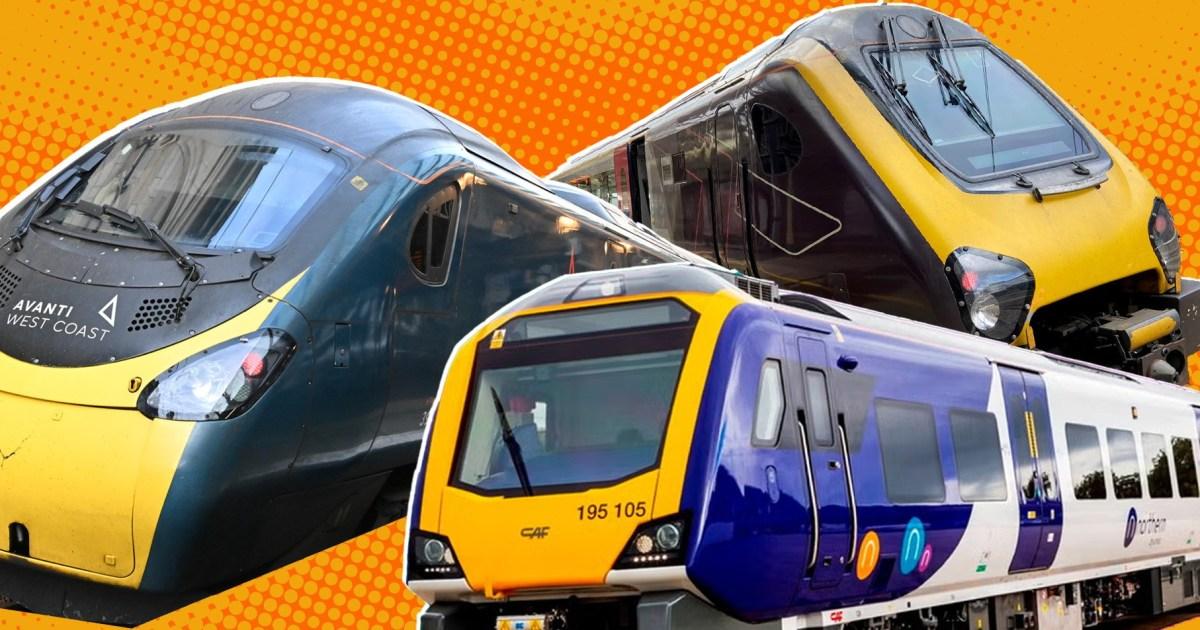New figures have revealed the train companies with the highest rate of cancellations (Picture: Getty)
It is that time of the year again to take stock of the past year, including how well or badly UK train operators fared for travel.
And that includes digging into the latest train delay figures which reveal that more than 360,000 train services across the UK were fully or partially cancelled.
If you have ever been trapped on a stuck train or anxiously looked on a train station information board as the departure time keeps slipping further away, this number can be particularly infuriating.
Campaigners said the delays and cancellations ‘erode passengers’ faith in the railways’ and that cancellations are likely to get worse.
Passengers waiting for their trains at London Paddington station (Picture: PA)
Here is a roundup of the best and worst train operators for cancellations.
The train service reliability is said to be affected by major staffing shortages.
Train companies with most cancellations
A total of 208,000 services were fully or partially axed in the past year, while 161,000 were part-cancelled which means they failed to serve at lest one of their planned stops.
The first spot goes to Avanti West Coast which got the highest cancellation score, according to PA news agency’s analysis of the latest Office of Rail and Road (ORR) data.
Avanti West Coast had a cancellation score of 7.8% in the year to November 9.
Commuters at York station platform (Picture: Bloomberg/Getty Images)
It was followed by CrossCountry (7.4%), Northern (5.7%) and Govia Thameslink Railway (5.2%).
The cancellation score – produced by the rail industry – is created by counting full cancellations as one and part cancellations as half.
In the UK overall, 4.0% of the 7.3 million trains in the year to November 9 were cancelled – the worst joint reliability performance figure since March 2015 when records began when the cancellation score was just 1.9%.
What about the best performing train company?
C2C was named as the best performer for cancellations on its services between London and Essex with a score of 1.6%.
What is causing the cancellations?
Weekend train services have been particularly badly hit as many operators rely on train drivers or guards volunteering to work paid overtime on Sundays.
Great Western Railway, Northern and ScotRail are among the operators affected by this.
The successive governments were accused of a ‘failure’ to resolve rail staffing issues, according to Modern Railway’s journalist Tony Miles.
The ‘poor performance’ meant people were put off trains and ‘back onto the roads which is completely contrary to what government ambition should be,’ he said.
He warned that cancellations are ‘probably going to get worse’ as drivers are retiring faster than they are being recruited, adding that the situation is a ‘ticking time bomb.’
‘Passengers are being let down by poor services’
The Department for Transport said that passengers are being ‘let down by poor services.’
A DfT spokesperson said: ‘Passengers are being let down by poor services, which is why we are committed to delivering the biggest overhaul of the railways in a generation.
‘Bringing services back into public ownership will put passengers at the heart of everything we do and allow us to reinvest into our railways.
‘We have been clear we will not tolerate poor performance and will continue to hold all operators to account, regardless of ownership.’
Michael Solomon Williams, an advocate with Campaign for Better Transport, said: ‘Delays and cancellations erode passengers’ faith in the railways.
‘The rail industry and Government must work together to invest in both the workforce and infrastructure to improve reliability across the whole network.’
The new Labour government has taken some action over Britain’s railways.
It plans to renationalise the train operators, and the first companies set for the ‘shake-up’ were named in early December.
What have train operators said?
A spokesperson for the Rail Delivery Group, which represents train operators, said: ‘We know how much passengers rely on the railway and the importance of reliable and punctual services.
‘Rail staff work hard to enable five million journeys every day and the industry is working together to address the main causes of delays and cancellations.
‘Delays and cancellations can occur due to various factors like weather and flooding, industrial action, infrastructure issues such as track or signalling faults, train faults and external incidents such as trespass.
‘When this happens, we are raising awareness of delay repay compensation to ensure passengers can easily claim what they are entitled to.’
Get in touch with our news team by emailing us at webnews@metro.co.uk.
For more stories like this, check our news page.
Arrow
MORE: What is happening with the new £9,000,000,000 River Thames crossing?
Arrow
MORE: Dartford Crossing shuts to traffic after oil tanker causes ‘risk of explosion’
Arrow
MORE: How the first female Tube driver paved the way for others
Checkout latest world news below links :
World News || Latest News || U.S. News
The post More than 360,0000 trains were delayed or cancelled this year appeared first on WorldNewsEra.

